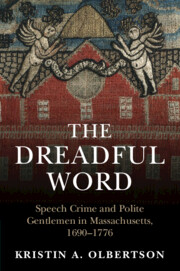3 - Sensibility
Published online by Cambridge University Press: 03 March 2022
Summary
Courtrooms constituted public forums for structuring the speech economy, the social identity of individuals, and the social order as a whole, according to the criteria of gentility. The amorphousness and subjectivity of “noise,” “railing,” and “abuse” made them the ideal vehicles into which to import prevailing conceptions of impolite speech and persons. Prosecutions for these offenses helped clarify distinctions between polite and vulgar, civilized and unrefined, the empire and the wilderness. Threats and menaces constituted a type of insensible speech that was located just at the boundary between language and violence. The criminal law – the most public and formal institution for policing profane speech – became directed primarily against the non-elite; the elite, meanwhile, were generally subject only to private and extralegal sanctions for swearing. For them, their prosecutions became vehicles for demonstrating their facility with legal procedure, possession of genteel qualities such as sensibility, and relative lack of legal accountability for otherwise transgressive speech.
- Type
- Chapter
- Information
- The Dreadful WordSpeech Crime and Polite Gentlemen in Massachusetts, 1690–1776, pp. 62 - 126Publisher: Cambridge University PressPrint publication year: 2022

